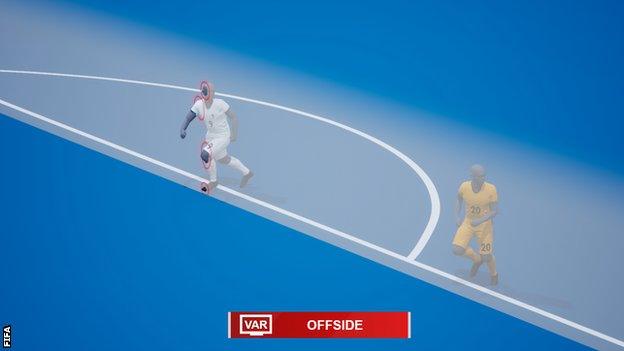Qatar 2022: Fifa introduces new offside rule technology for World Cup
- Published
- comments

Fifa says it will use state-of-the-art technology to help speed up offside rule decision-making at this year's World Cup.
The major football tournament, which happens once every four years, will be taking place this November in Qatar.
In football, a referee would usually be expected to make a judgement on an offside offence.
But Fifa officials hope this automated system will make offside offences easier to spot.
What is the offside rule?
When a football player tries to score a goal, the attacker can't be ahead of the second-to-last defender, including the goalkeeper, when the ball is played to them.
A player can be level with the defender, but they cannot make contact with the ball ahead of the defender.
This is a famous rule of football, and an important one as it stops players from hanging around near a goal waiting for the chance to score.
If a player does not follow this rule, it is known as an offside offence.
You can read more about the offside rule and other football terms here.
Why has Fifa introduced this system?
The technology will be used in the World Cup taking place in Qatar in November
Fifa is hoping that this new system will speed up decision-making about the offside rule.
It also says that it will put less pressure on referees to spot an offside offence if their view of the incident was limited.
The system was tested at the Arab Cup and Club World Cup last year.
It's thought that the automatic system reduced decision-making time from 70 seconds to 25 seconds on average.
How does it work?
Twelve synchronised cameras will be mounted to every stadium to watch for offside offences
The system works in a number of ways.
A sensor in the middle of the football sends 500 data points a second to confirm the exact moment and point at which the ball was kicked.
And twelve synchronised cameras will be mounted to the tops of every stadium to monitor every movement on the pitch.
Players found to be in the offside position will immediately trigger an alert to the VAR system.
How does VAR work? (from 2019)
What has the reaction been?
Fifa's head of refereeing, Pierluigi Collina, says the technology is ready
Introducing automated systems can be controversial.
Some people say that using too much technology to make decisions takes power away from the referee and can actually slow a match down, rather than speed it up.
Technology like VAR has often been criticised for disrupting the flow of matches, sometimes pausing a game for minutes at a time.
But former six-time World's Best Referee and Fifa's head of refereeing Pierluigi Collina, disagrees with the criticism.
"We are very positive. It is ready," he commented following the announcement of the new system.
And he argues that the referee still has important decision-making powers.
"Our goal is to get referees taking decisions correctly on the field," he said.
"If something wrong should happen, the referee may take advantage of the technology to get a better vision of what happened - but there will still be room for discussion."
- Published10 August 2017
- Published30 March 2022
- Published24 February 2015
